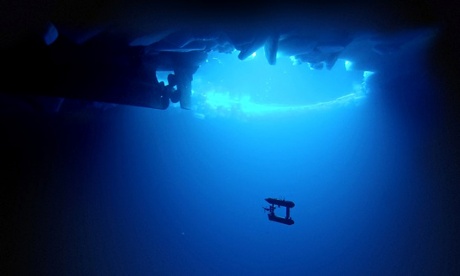The precarious state of a vast, remote Antarctic glacier will provide an inaugural mission for the British vessel once dubbed Boaty McBoatface, as scientists from the UK and US set up a new £20m research operation.
Scientists from both countries are to collaborate on the five-year project to examine the Thwaites glacier in west Antarctica, a major structure that drains an area about the size of the UK.
Any firm indication that the glacier could be responding to a warmer climate with faster icemelt could presage disaster for coastal areas of the globe, with the potential for sea-level rises some scientists put as high as 1.5m by the century’s end.
One of the principal research vessels will be the RSS Sir David Attenborough, the £200m research ship originally voted to be christened Boaty McBoatface in an online poll two years ago. The joke name lives on in the ship’s remotely operated submarine.
Scott Borg, deputy assistant director of the US National Science Foundation, said the expedition was of global significance. “This is critically important to all of us, no matter where we live. What happens in the Antarctic does not stay in the Antarctic. We do not know how quickly [the glacier] will contribute to sea level rises, and whether we have decades or centuries to prepare for it.”
He warned of possible changes to global ocean circulation, as well as sea-level rises, that could result from more rapid melting. Scientists have grown increasingly concerned over the effect of melting ice, from the polar ice caps and glaciers on land, on global ocean currents, with a recent study showing the Atlantic’s gulf stream at its weakest for 1,600 years.
In a nod to climate sceptics in the US, Borg said: “Some people say this is expensive. But our coastal cities and economies are at stake.”
He called the five-year project, to begin this October, “international cooperation at its best, and in keeping with the Antarctic treaty” that would “yield unprecedented understanding of the future of this critical part of Antarctica”.
The participation of the US was seen as particularly significant, given the withdrawal from the Paris agreement on climate ordered by president Donald Trump, who has also put forward plans to cut climate science budgets.
Duncan Wingham, chair of the UK’s Natural Environment Research Council, described the Thwaites glacier as “one of the least explored parts of the Antarctic continent”, making the investigation crucial to studying the state and future of the region.
Sea-level rises are a hotly contested area of climate science. The Intergovernmental Panel on Climate Change has forecast that average sea-level rises could be held to roughly 25cm to 40cm if governments take strong action on greenhouse gases. However, this does not take account of the potential for rapid melting or collapse of glaciers in Antarctica.
Satellites already show the Thwaites glacier is changing rapidly, but only by putting researchers close to the glacier itself will it be possible to measure the rates of ice volume and ice mass change. Remote submersibles such as Boaty McBoatface will be essential: recent research showed that the undersea melting of Antarctic glaciers is more of a problem that had been thought. If the expedition discovers stability in the Thwaites glacier, it could assuage some of the worst fears of climate experts.
Changes in global ocean circulations have also fallen under the spotlight as scientists warned only weeks ago over the effects on the Gulf stream, which brings temperate weather to Europe. The potential effects of climate change and melting ice on ocean currents are still poorly understood, requiring intensive and often expensive scientific research involving ships, buoys, satellites and complex computer models.
The £20m will be used by the UK’s Natural Environment Research Council and the US National Science Foundation, involving about 100 scientists, in the biggest joint project by the two countries in Antarctica since the end of a mapping project in the late 1940s. Researchers from other countries, including South Korea, Germany, Sweden, New Zealand and Finland, will also contribute and the resulting science made available globally.











